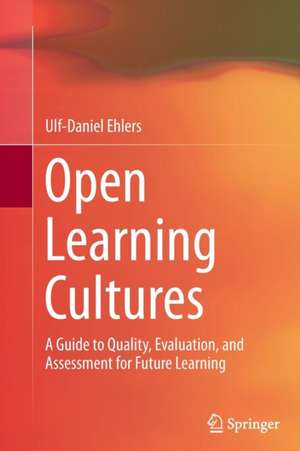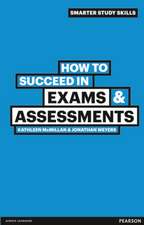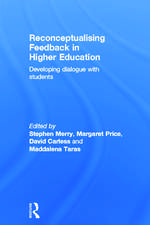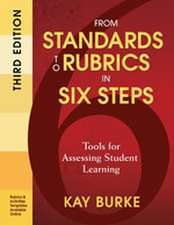Open Learning Cultures: A Guide to Quality, Evaluation, and Assessment for Future Learning
Autor Ulf-Daniel Ehlersen Limba Engleză Paperback – 23 aug 2016
While in higher education institutions most assessments are still tied to formal learning scenarios, teachers are more and more bound to recognize their students’ informal learning processes and networks. This book will help teachers, lecturers and students to better understand how open learning landscapes work, how to define quality and create assessments in such environments, and how to apply these new measures.
To this end, Ehlers first elaborates the technological background for more collaborative, distributed, informal, and self-guided learning. He covers the rise of social media for learning and shows how an architecture of participation can change learning activities. These new paradigms are then applied to learning and education to outline what open learning landscapes look like. Here he highlights the shift from knowledge transfer to competence development, the increase in lifelong learning, and the importance of informal learning, user generated content, and open educational resources. He then shows how to manage quality by presenting a step by step guide to developing customized quality concepts for open learning landscapes. Finally, several methods dealing with assessment in these new environments are presented, including guidelines, templates and use cases to exemplify the approaches.
Overall, Ehlers argues for assessment as an integral part of learning processes, with quality assurance as a method of stimulating a quality culture and continuous quality development rather than as a simple controlling exercise.
| Toate formatele și edițiile | Preț | Express |
|---|---|---|
| Paperback (1) | 386.00 lei 6-8 săpt. | |
| Springer Berlin, Heidelberg – 23 aug 2016 | 386.00 lei 6-8 săpt. | |
| Hardback (1) | 393.35 lei 6-8 săpt. | |
| Springer Berlin, Heidelberg – 20 sep 2013 | 393.35 lei 6-8 săpt. |
Preț: 386.00 lei
Nou
Puncte Express: 579
Preț estimativ în valută:
73.86€ • 77.12$ • 61.13£
73.86€ • 77.12$ • 61.13£
Carte tipărită la comandă
Livrare economică 04-18 aprilie
Preluare comenzi: 021 569.72.76
Specificații
ISBN-13: 9783662506035
ISBN-10: 3662506033
Pagini: 257
Ilustrații: XVIII, 239 p. 38 illus.
Dimensiuni: 155 x 235 x 14 mm
Greutate: 0.37 kg
Ediția:Softcover reprint of the original 1st ed. 2013
Editura: Springer Berlin, Heidelberg
Colecția Springer
Locul publicării:Berlin, Heidelberg, Germany
ISBN-10: 3662506033
Pagini: 257
Ilustrații: XVIII, 239 p. 38 illus.
Dimensiuni: 155 x 235 x 14 mm
Greutate: 0.37 kg
Ediția:Softcover reprint of the original 1st ed. 2013
Editura: Springer Berlin, Heidelberg
Colecția Springer
Locul publicării:Berlin, Heidelberg, Germany
Notă biografică
Ulf-Daniel Ehlers is Professor for Educational Management and Lifelong Learning, and Vice-President for Quality and Academic Affairs at Baden-Wurttemberg State University in Stuttgart, Germany. His research interests are in e-learning, quality development, and educational systems development. He is also President of the European Foundation for Quality in E-Learning, and is active in many research and development projects.
Textul de pe ultima copertă
Today we are seeing a new form of blended learning: not only is technology enhancing the learning environment but formal and informal learning are combining and there is self- and peer-assessment of results. Open learning cultures are challenging the old and long-practiced methods used by educators and transforming learning into a more student-driven and independent activity , which uses online tools such as blogs, wikis or podcasts to connect resources, students and teachers in a novel way.
While in higher education institutions most assessments are still tied to formal learning scenarios, teachers are more and more bound to recognize their students’ informal learning processes and networks. This book will help teachers, lecturers and students to better understand how open learning landscapes work, how to define quality and create assessments in such environments, and how to apply these new measures.
To this end, Ehlers first elaborates the technological background for more collaborative, distributed, informal, and self-guided learning. He covers the rise of social media for learning and shows how an architecture of participation can change learning activities. These new paradigms are then applied to learning and education to outline what open learning landscapes look like. Here he highlights the shift from knowledge transfer to competence development, the increase in lifelong learning, and the importance of informal learning, user generated content, and open educational resources. He then shows how to manage quality by presenting a step by step guide to developing customized quality concepts for open learning landscapes. Finally, several methods dealing with assessment in these new environments are presented, including guidelines, templates and use cases to exemplify the approaches.
Overall, Ehlers argues for assessment as an integral part of learning processes, with quality assurance as a method of stimulating a quality culture and continuous quality development rather than as a simple controlling exercise.
While in higher education institutions most assessments are still tied to formal learning scenarios, teachers are more and more bound to recognize their students’ informal learning processes and networks. This book will help teachers, lecturers and students to better understand how open learning landscapes work, how to define quality and create assessments in such environments, and how to apply these new measures.
To this end, Ehlers first elaborates the technological background for more collaborative, distributed, informal, and self-guided learning. He covers the rise of social media for learning and shows how an architecture of participation can change learning activities. These new paradigms are then applied to learning and education to outline what open learning landscapes look like. Here he highlights the shift from knowledge transfer to competence development, the increase in lifelong learning, and the importance of informal learning, user generated content, and open educational resources. He then shows how to manage quality by presenting a step by step guide to developing customized quality concepts for open learning landscapes. Finally, several methods dealing with assessment in these new environments are presented, including guidelines, templates and use cases to exemplify the approaches.
Overall, Ehlers argues for assessment as an integral part of learning processes, with quality assurance as a method of stimulating a quality culture and continuous quality development rather than as a simple controlling exercise.
Caracteristici
Details the influence of collaborative web-based technology on learning environments and learning behavior Provides educators, teachers, lecturers and students with a practical guide to developing customized quality concepts in open learning environments Includes guidelines, templates and use cases to facilitate the practical implementation of the methods presented Presents a concept of quality control and assessments as an integral part of learning processes Includes supplementary material: sn.pub/extras










